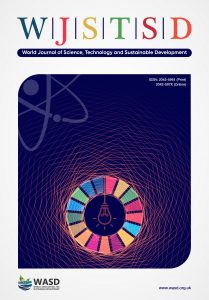Poverty reduction through enabling factors, Dr. Khurshed Alam
Dr. Khurshed Alam
Bangladesh Institute of Social Research Trust, Dhaka
Bangladesh
Email: khurshedbisr@gmail.com
DOI: 10.1108/WJSTSD-07-2016-0049
Purpose: The purpose of this paper is to identify the factors which are instrumental to poverty reduction opposed to many factors that are considered as impediments to poverty reduction in a poor country like Bangladesh.
Design/methodology/approach: This paper is an outcome of review of literature covered wide range of issues including sectoral contribution to economic growth but none has exclusively dealt with the instrumental role of the poverty reduction factors, insider' s view, long-term observations (1960-2014), and reviews of secondary data.
Findings: In order to reduce poverty, rather than attempting to change the “culture of poverty,” remove the “structural trap,” or “kin system as poverty trap” it can be achieved through harnessing the enabling factors of poverty reduction. Study argues that rather than focusing on “barriers” to poverty reduction, a country needs to identify and focus on its “potential” factors of poverty reduction. The dominant enabling factors for Bangladesh were agricultural development and remittance. The utilization of land and labor could bring a transformation in the rural economy of Bangladesh which was essential to poverty reduction.
Practical implications: The study shows that the individuals can escape poverty largely through their own effort where a proper policy support from the government is needed. The state needs to play the facilitating role rather than the instrumental in the case of poverty reduction.
Originality/value: The paper reveals instruments to poverty reduction where usual practice was to identify the barrier to development and to suggest the means of overcoming those barriers. It suggests how to look into the matter from other way round where instead of identifying the barrier attempt should be made to identify the enabling factors and to harness those enabling factors. The findings are based on the country-specific literatures but not generalized in the form as attempted here. The study shows a means of poverty reduction where country-specific strategy or home-grown model can be drawn out based on the identification of potential factors.
Keywords: Bangladesh; Poverty alleviation; Culture of poverty; Kinship trap; Poverty trap.
Citation: Alam, K. (2017), "Poverty reduction through enabling factors", World Journal of Science, Technology and Sustainable Development, Vol. 14 No. 4, pp. 310-321. https://doi.org/10.1108/WJSTSD-07-2016-0049

